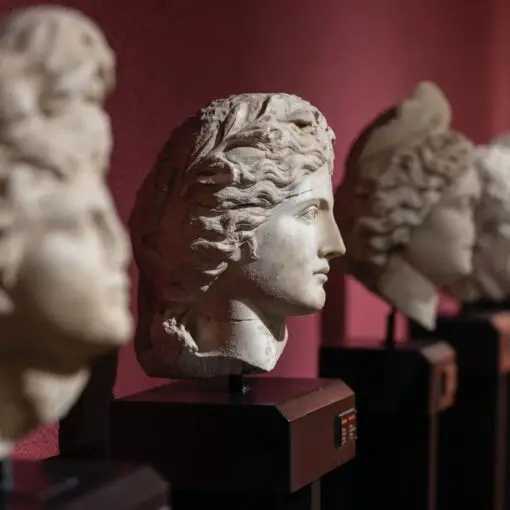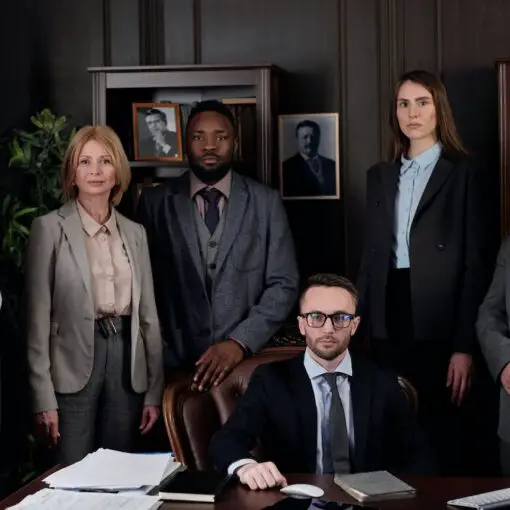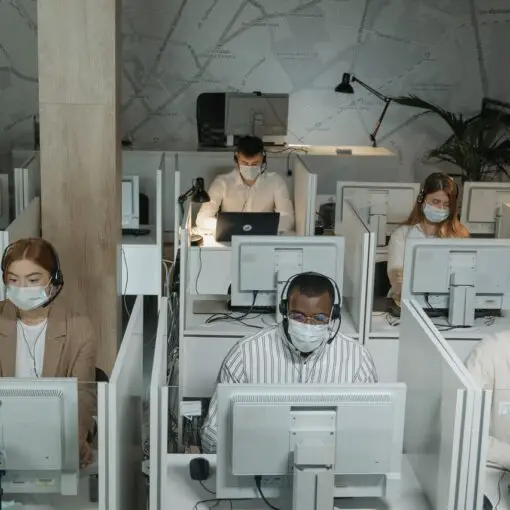Have you heard the phrase “critical thinking” thrown around a lot? You probably have if you think about it for a second. But what does it mean?
In short, critical thinking helps us make rational decisions and come to a more objective understanding of ourselves and the world around us.
This article will cover why critical thinking is so important and then break down the best 7 critical thinking books for beginners so you can begin honing your own critical thinking skills right away.
For those who are immediately curious, the 7 books are:
- Wait, What?: And Life’s Other Essential Questions by James E. Ryan
- Think Smarter: Critical Thinking to Improve Problem-Solving and Decision-Making Skills by Michael Kallet
- The Art of Thinking Clearly by Rolf Dobelli
- Predictably Irrational: The Hidden Forces that Shape Our Decisions by Dan Ariely
- A Rulebook for Arguments by Anthony Weston
- Weaponized Lies: How to Think Critically in the Post-Truth Era by Daniel J. Levitin
- The Demon-Haunted World: Science as a Candle in the Dark by Carl Sagan
Critical thinking—why it’s important
We can trace critical thinking—although a term developed as recently as the twentieth century—to Ancient Greece and the teachings of Socrates.
Socrates’ method of asking questions and accepting a skeptical, limited version of knowledge provides much of the modern foundation for critical thinking:
- “An unexamined life is not worth living.”
- “One thing only I know, and that is that I know nothing.”
- “To find yourself, think for yourself.”
With these three quotes from Socrates, we see that it is essential to ask questions, examine our lives deeply, recognize that we have limitations to understanding, and follow our own line of thinking rather than that of others.
Indeed, critical thinking is not just thinking, but critical thinking. From the Greek word kritikos (“critic”), it implies critique, that is, judgment or discernment. We are not just thinking but making judgments, reflecting on ourselves and the world.
This kind of thinking is essential in that it helps us to better understand ourselves and our desires, to help us more objectively view the world and our place in it.
A critical thinking mindset can help encourage curiosity, enhance creativity, hone our problem-solving abilities, cultivate independence, and improve our overall mental faculties (and thus lives).
To help you improve your own critical thinking, here are the best 7 critical thinking books for beginners (although almost anyone will appreciate the insights they contain).
Best 7 critical thinking books for beginners
Wait, What?: And Life’s Other Essential Questions by James E. Ryan
A Dean at Harvard University, James E. Ryan’s Wait, What?: And Life’s Other Essential Questions takes us through history, politics, and his own life to analyze the importance of asking questions, being curious, finding motivation, strengthening relationships, and staying focused on what really matters in life.
The book begins with five questions that we’ve all asked at one point or another:
- I wonder…?
- What?
- How can I help?
- What truly matters?
- Couldn’t we at least?
Ryan uses these to demonstrate how important it is to not only ask questions but to ask the right questions. Doing so allows us to avoid miscommunicating and finding wrong answers rather than the right ones.
Overall, Wait, What? will inspire you to take more chances, be more courageous, and reflect on how to ask the right question at the right time, enabling you to make better-informed decisions and take the right action for yourself.
Think Smarter: Critical Thinking to Improve Problem-Solving and Decision-Making Skills by Michael Kallet
Michael Kallet’s book Think Smarter: Critical Thinking to Improve Problem-Solving and Decision-Making Skills offers a complete guide to training (or re-training) your brain to work at a higher degree of efficiency and success. As a critical thinking expert and coach, Kallet provides an entire framework to help put critical thinking into practice right away.
The book often draws on real-life examples that help make some of the more difficult concepts easier to understand. As a kind of instruction manual, the book is great not only for individuals but also for businesses who want to help their employees achieve their best.
Kallet’s work reminds us that so much of our thinking is “automatic” and endeavors to get us thinking more critically, that is, with more purpose and intention. By following the steps that he lays out, you’ll be able to make better decisions, solve problems more efficiently, and even innovate in your given field.
The Art of Thinking Clearly by Rolf Dobelli
The Art of Thinking, a quite useful book by Rolf Dobelli, became an international bestseller, no doubt thanks to how many people it has helped. Broken up into nearly 100 short chapters, Dobell runs through a laundry list of cognitive biases, which are simple errors that we all tend to make.
With the comprehensive overview provided by Dobelli, you will be better equipped to recognize your own erroneous thinking and thus come to better decisions about your own habits and behaviors.
Each common error of judgment that he covers also includes how to overcome it, which helps make this book very practical for beginners to critical thinking who want to improve their lives and feel better about themselves.
Predictably Irrational: The Hidden Forces that Shape Our Decisions by Dan Ariely
Dan Ariely wrote a wonderful book in Predictably Irrational: The Hidden Forces that Shape Our Decisions. In it, he outlines the irrational nature of certain choices we make, why we make impulsive decisions, and how we sometimes take an overly optimistic view that blinds us to reality.
Like Rolf Dobelli (reviewed above), Ariely provides a substantial list of cognitive errors and harmful tendencies that make our lives more difficult. As such, you’ll be better equipped to understand human nature and how to get away from the irrational thinking that we all tend toward.
This is definitely one of the most helpful books on the list, as Ariely lays out a great deal of our shared irrational tendencies and explains how they’re not just random behaviors but actually predictable—hence the book’s title.
With the understanding of why we tend to engage in irrational behavior, Ariely’s book will help improve your critical thinking and lessen your likelihood of irrational thinking and behaviors.
A Rulebook for Arguments by Anthony Weston
For people short on time, Anthony Weston’s A Rulebook for Arguments will be appealing. At just around 100 pages, Weston packs in an incredible amount of useful information on critical thinking.
A standard in high schools and universities, Weston’s book employs a wide variety of real-world examples to break down somewhat complex concepts like deductive reasoning, argument by analogy, and more.
With many concise synopses and its structure as a rulebook, Weston’s book breaks down critical thinking in a way that can appeal to readers of all ages and education levels.
And due to its compact size and this well-organized structure, A Rulebook for Arguments belongs on anyone’s shelf (or e-reader library) who wants to have a handy reference for anything related to critical thinking and argumentation.
Weaponized Lies: How to Think Critically in the Post-Truth Era by Daniel J. Levitin
A winner and finalist for many book prizes, Daniel J. Levitin’s Weaponized Lies: How to Think Critically in the Post-Truth Era is essential reading for anyone who wants to avoid the harmful extremes of cynicism and gullibility.
In an age where we are perpetually targeted as consumers or voters, it is more important than ever to understand how we can easily be manipulated. Levitin specifically focuses on how the misrepresentation of numbers and statistics can fool us into thinking one way.
Turning to the scientific method, Levitin thus helps guide readers to a better idea of what (and how) we can know. He uses many case studies to help make his ideas more concrete, which helps make this book more accessible for beginners.
For really anyone, but especially those interested in politics and remaining unswayed by deceitful argumentation, Levitin’s book is a must-have.
The Demon-Haunted World: Science as a Candle in the Dark by Carl Sagan
Carl Sagan is a legendary author and scientist perhaps best known for his science show Cosmos. He was also a terrific writer, and, although first published in the 1990s, Sagan’s book The Demon-Haunted World: Science as a Candle in the Dark remains a compelling argument for more scientific reasoning to make the world a better place for all of us.
Taking a conversational tone, Sagan contends that critical thinking is essential for the healthy functioning not only of individuals but of democratic societies. We need to reject irrational thinking if we are to improve the state of ourselves and the world.
Readers will appreciate Sagan’s at times poetic prose and consistently rational thinking. It will please not only science-oriented people but anyone who desires to think more critically about the world.
Critical thinking can be learned
The key takeaway from these books is that critical thinking can be learned. It isn’t just some innate skill but something that can be taught. Each in their own way, these books will give you a great understanding of yourself and the world at large by teaching you how to think more critically.
And while these are the best 7 critical thinking books for beginners, they will appeal to people of all ages and education levels who want to enhance their critical thinking, an essential skill for the modern world.
So, check out any or all of these books to come to logical conclusions, make better decisions, understand how to process information and statistics, avoid cognitive biases, and reevaluate your beliefs and habits.
Happy reading!





